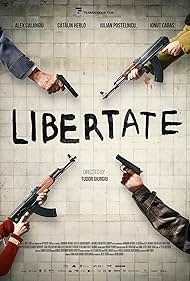During the Romanian Revolution of 1989, Sibiu witnesses a violent attack on a police station that escalates into armed clashes between soldiers, police, demonstrators and the secret police. References Rocky (1976). 1. Great production of 'Sloboda' or 'Liberty' (2023), directed by Tudor Giurgiu and produced by Oana Giurgiu, is a rare gem among the few pieces of Romanian filmography that deals with the events that took place in Romania in December 1989. The experience is extremely immersive thanks in part to fast and well-thought-out camera movements (as if you were one of the background characters witnessing the story) and incredible sound design and effects (complementing your hearing, presence during these events). This effect is also achieved through fairly close camera and sound focus/angles/framing/sound design during dialogue or action scenes. Everything, from the decor to the after effects, portrays a full and deeply immersive experience of the '89 revolution from Sibiu that evokes a “Hollywood budget” feel; a production factor for which the production team is to be commended and which makes this film a must-see for all Romanians, especially those who have not experienced these events and would greatly benefit from adding this small reference point to their country’s history observation vocabulary. As for the dialogue, the lines are delightfully racy, capturing the varied vocabulary of the times and the spirit of the Romanian people through their language in the face of adversity (thanks in no small part to the flawless performances of the actors and actresses). The immersion is unbroken and spanning cliches, with modern, humorous moments here and there and the overarching theme of the Romanian proverb: “Facem haz de necaz”; – or "Fun when you’re in trouble" it remains beautifully captured, something Romanian audiences would clearly empathize with despite the colourless, hopeless and ghastly atmosphere. 2. Missing MessageThe other side of the coin is what ended up feeling like an incomplete artistic vision on the part of the directing team. To put it bluntly, you leave the theater with the confusing feeling that you didn’t quite get the movie’s message – like you’ve thrown a perfectly crafted cake at 1pm on a random Tuesday and wonder to yourself what an occasion this is. As other reviewers have said, this film is an exceptional x-ray of the events that took place during that period, but like any x-ray, it requires a diagnosis that should lead the patient to the end result of a correct and digestible conclusion – maybe not. in the case of modern art, but certainly when it comes to historical films. In the case of 'Libertate' The director’s vision has either been overshadowed by a focus on production and realism, or diluted in the process to the point where the viewer doesn’t feel gently rolled toward an overarching message or final moral, as is usually the ultimate goal of storytelling, regardless of medium. This may be partly due to the deliberate neutrality of the directorial vision, or an accidental oversight due to the focus on the story itself, the research and its delivery. However, conclusions can still be drawn, but they could have been left uncomfortably to the discretion and subjective experience of the viewer, who in this case, regardless of generation, is looking less for freedom of opinion and more for an answer to what really happened '89 and who is responsible for the number of deaths that occurred.




 44/44
44/44